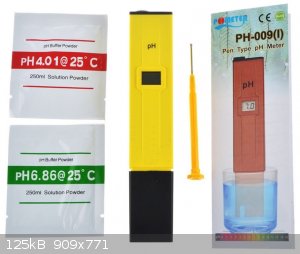LD5050
Hazard to Others
  
Posts: 182
Registered: 16-1-2017
Member Is Offline
Mood: No Mood
|
|
Re-calibrating digital PH meter?
I bought a PH meter, brand name "Poit" I believe I bought it from eBay. It came with three or four different pH buffer powder that I to add to water
and I am soposed to calibrate the meter according to these specific pH solutions. Now what I want to do is calibrate it again because it is currently
all out of wack for some reason after only using it once. The solution's that I am to calibrate it to are pH 4.00, 6.86, and 9.18. I don't have any
more of these packets so I was curious if I could somehow make a solution of a known pH with some other basic or acidic solution to calibrate my
meter. I would have to make the pH of the liquid the same or close to the pH's given. I have cheap pH paper to test the liquids before calibration but
I won't be able to get too accurate tho.
While writing this I kind of just figured out the answer to my own question and I am going to make a pH solution as close as possible to the numbers I
gave but maybe some one knows how I can get more accurate? Any help would be good I guess thanks in advance.
|
|
|
j_sum1
Administrator
       
Posts: 6218
Registered: 4-10-2014
Location: Unmoved
Member Is Offline
Mood: Organised
|
|
Those little packets are easily available on eBay if you need them. I have maybe a dozen on hand. I could mail you some but buying them direct is
probably a lot more cost effective than paying Aus-US postage.
|
|
|
DistractionGrating
Hazard to Self
 
Posts: 68
Registered: 3-4-2014
Member Is Offline
Mood: Precipitated
|
|
http://delloyd.50megs.com/moreinfo/buffers2.html
|
|
|
DistractionGrating
Hazard to Self
 
Posts: 68
Registered: 3-4-2014
Member Is Offline
Mood: Precipitated
|
|
See Table 2: https://www.iupac.org/publications/pac/2002/pdf/7411x2169.pd...
|
|
|
LD5050
Hazard to Others
  
Posts: 182
Registered: 16-1-2017
Member Is Offline
Mood: No Mood
|
|
Thanks you guys are awesome but I don't have the reagents that those buffer solutions require. For strong bases and acids I have NaOH, household
ammonia, sodium carbonate/bicarbinate, muriatic acid, citric acid, boric acid,sulfamic acid...
|
|
|
DistractionGrating
Hazard to Self
 
Posts: 68
Registered: 3-4-2014
Member Is Offline
Mood: Precipitated
|
|
The 9.18 buffer is just common laundry borax.
|
|
|
UC235
National Hazard
   
Posts: 565
Registered: 28-12-2014
Member Is Offline
Mood: No Mood
|
|
Here's the formulas for the three buffers: http://www.wako-chem.co.jp/english/labchem/product/analytica...
Borax (disodium tetraborate) is easily available as mentioned above and can be repeatedly crystallized from water to get a high purity product to
prepare the 9.18 buffer. Use boiled distilled water to make the final solution.
The 6.86 will be a little hard to prepare at home unless you can buy reagent grade material. Potassium dihydrogen phosphate isn't very hard to
recrystallize but the disodium hydrogen phosphate forms several hydrates which may not be the easiest to work with.
4.005 is potassium acid phthalate, a primary titration standard used in labs everywhere for standardizing NaOH solutions in intro chem courses. It's
not terribly expensive and can be ordered without suspicion. It can be made, but with considerable difficulty from cheap vinyl gloves in an involved
extraction procedure.
EDIT: those formulas are in the above paper. nevermind.
[Edited on 9-7-2017 by UC235]
|
|
|
unionised
International Hazard
    
Posts: 5102
Registered: 1-11-2003
Location: UK
Member Is Offline
Mood: No Mood
|
|
The "easy to find in the kitchen" buffers are saturated borax solution and saturated cream or tartar solution. pH 9.23 and pH 3.557.
Using saturated solutions means you have to pay some attention to temperature, but you don't need to weigh anything.
|
|
|
Sulaiman
International Hazard
    
Posts: 3554
Registered: 8-2-2015
Location: 3rd rock from the sun
Member Is Online
|
|
If you are using the cheap eBay type of digital pH meter like this

I have one with ATC and one without ... they get very little use.
. temperature affects pH (even of water) so without ATC not much accuracy can be expected
. with ATC I was very pleased ... for a few months.
- I rinsed and dried the probe carefully after each use
- I did not abuse it
Even after 'callibration' (single point callibration at pH6.9 and check at pH4.0) I find it gives erratic readings, with quite slow response
and you need to take such a large sample to measure.
I can't really say much good about these pH meters other than 'they are cheap'.
I now use different types of pH papers, or phenolphthalein, and occasionally red cabbage juice.
Hopefully you will find yours more useful than I have found mine to be.
[Edited on 9-7-2017 by Sulaiman]
CAUTION : Hobby Chemist, not Professional or even Amateur
|
|
|
LD5050
Hazard to Others
  
Posts: 182
Registered: 16-1-2017
Member Is Offline
Mood: No Mood
|
|
Ya these things are pretty much junk I would say...
|
|
|
unionised
International Hazard
    
Posts: 5102
Registered: 1-11-2003
Location: UK
Member Is Offline
Mood: No Mood
|
|
Most pH electrodes are designed to be kept wet.
http://hannainst.com/ph-electrode-maintenance-calibration-gu...
|
|
|
feacetech
Hazard to Others
  
Posts: 163
Registered: 12-2-2007
Member Is Offline
Mood: No Mood
|
|
pH meters need care and constant calibration (even expesnive ones), pretty much before every use unless its within the same day
KCl solution is good for storing and regenrating glass electrodes
unless you need the accuracy pH paper is more reliable and often needed to confirm the digital reading
|
|
|